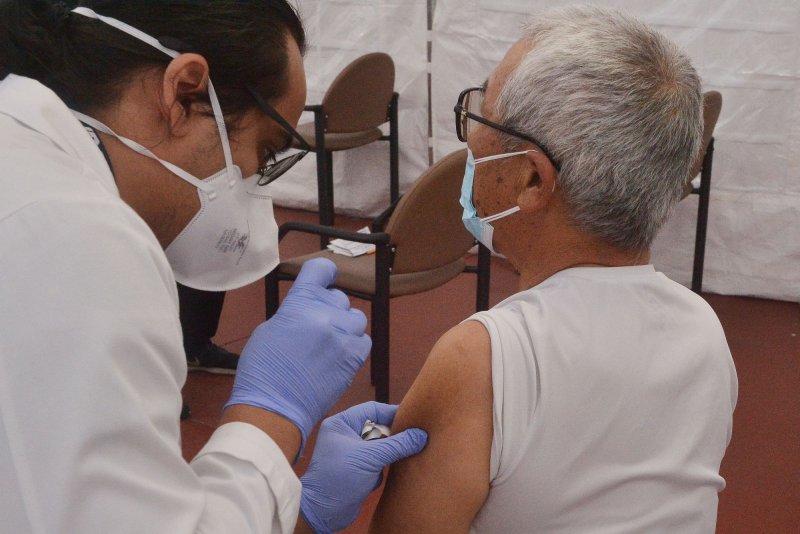U.S. sues Rite Aid over opioid prescriptions
By Darryl Coote

The Justice Department on Monday filed a lawsuit against Rite Aid, accusing it of illegally filling hundreds of thousands of prescriptions.
File Photo by Shawn Thew/EPA
March 14 (UPI) -- The United States on Monday sued Rite Aid and several of its subsidiaries on allegations they knew their pharmacists had for years filled hundreds of thousands of illegal prescriptions for controlled substances, fueling the opioid epidemic.
The complaint, filed in the U.S. District Court for the Northern District of Ohio, eastern division, accuses one of the country's largest retail pharmacies of not only filling the prescriptions despite red flags having been raised but of knowing it was occurring and taking steps to delete internal warnings about suspicious prescribers.
"The Justice Department is using every tool at our disposal to confront the opioid epidemic that is killing Americans and shattering communities across the country," Attorney General Merrick Garland said in a statement. "That includes holding corporations, like Rite Aid, accountable for knowingly filling unlawful prescriptions for controlled substances."
Federal and local governments have filled numerous lawsuits against companies on allegations of fueling the opioid epidemic, which between 1999 and 2020 resulted in the deaths of more than 564,000 people, according to the U.S. Centers for Disease Control and Prevention.
March 14 (UPI) -- The United States on Monday sued Rite Aid and several of its subsidiaries on allegations they knew their pharmacists had for years filled hundreds of thousands of illegal prescriptions for controlled substances, fueling the opioid epidemic.
The complaint, filed in the U.S. District Court for the Northern District of Ohio, eastern division, accuses one of the country's largest retail pharmacies of not only filling the prescriptions despite red flags having been raised but of knowing it was occurring and taking steps to delete internal warnings about suspicious prescribers.
"The Justice Department is using every tool at our disposal to confront the opioid epidemic that is killing Americans and shattering communities across the country," Attorney General Merrick Garland said in a statement. "That includes holding corporations, like Rite Aid, accountable for knowingly filling unlawful prescriptions for controlled substances."
Federal and local governments have filled numerous lawsuits against companies on allegations of fueling the opioid epidemic, which between 1999 and 2020 resulted in the deaths of more than 564,000 people, according to the U.S. Centers for Disease Control and Prevention.
Pharmaceutical companies, including retail pharmacies, such as CVS, Walgreens and Walmart, have reached multimillion and in such cases billion-dollar settlements with states that have filed thousands of lawsuits against them, with federal prosecutors filing their own. Late last year, the Justice Department sued AmerisourceBergen, one of the largest drug manufactures, on similar allegations to the case it brought Monday against Rite Aid.
In the Monday lawsuit, prosecutors accuse Rite Aid of filling the prescriptions from May 1, 2014, to June 10, 2019, despite obvious and often multiple red flags indicating misuse related to the prescriber, customer or a combination of both.
The prescriptions in question were either medically unnecessary, lacked a medically accepted indiction or were not issued in the usual manner, the document states.
While the pharmacists "ignored these red flags," the company knew that such prescriptions for controlled substances were "routinely and pervasively" filled, federal prosecutors said.
"While Rite Aid pharmacists were supposed to use a validation process for certain highly diverted controlled substances and to resolve red flags before dispensing, Rite Aid knew the validation process was a fig leaf," the complaint states
Rite Aid's Government Affairs Department is further alleged to have repeatedly directed employees to delete internal notes about suspicious prescribers logged in its dispensing software.
"Cash only pill mill???," "writing excessive dose[s] for oxycodone" and "DO NOT FILL CONTROLS" were among the examples of allegedly deleted notes included in the court document.
"Instead of ensuring this vital information was available to all Rite Aid pharmacists, a Government Affairs analyst admonished a Rite Aid pharmacist who added such a note 'to always be very cautious of what is put in writing,'" it continued.
Federal prosecutors state that despite knowing prescriptions for controlled substances were being filled for illegitimate medical purposes, Rite Aid "very rarely took action to stop the flow of opioids prescribed by that practitioner."
The federal government is specifically accusing the company with more than 2,200 pharmacies in 17 states of violating the Controlled Substances Act and the False Claims Act for submitting false or fraudulent claims for prescriptions to federal healthcare programs.
Prosecutors also filed the complaint in a whistleblower lawsuit brought against Rite Aide in 2019.
Rite Aid declined to comment on the litigation.
"The opioid crisis has exacted a heavy toll on communities across the United States. Today's complaint is an important reminder that the Justice Department will hold accountable any individuals or entities, including pharmacies, that fueled this terrible crisis," Principal Deputy Assistant Attorney General Brian Boynton said in a statement.














